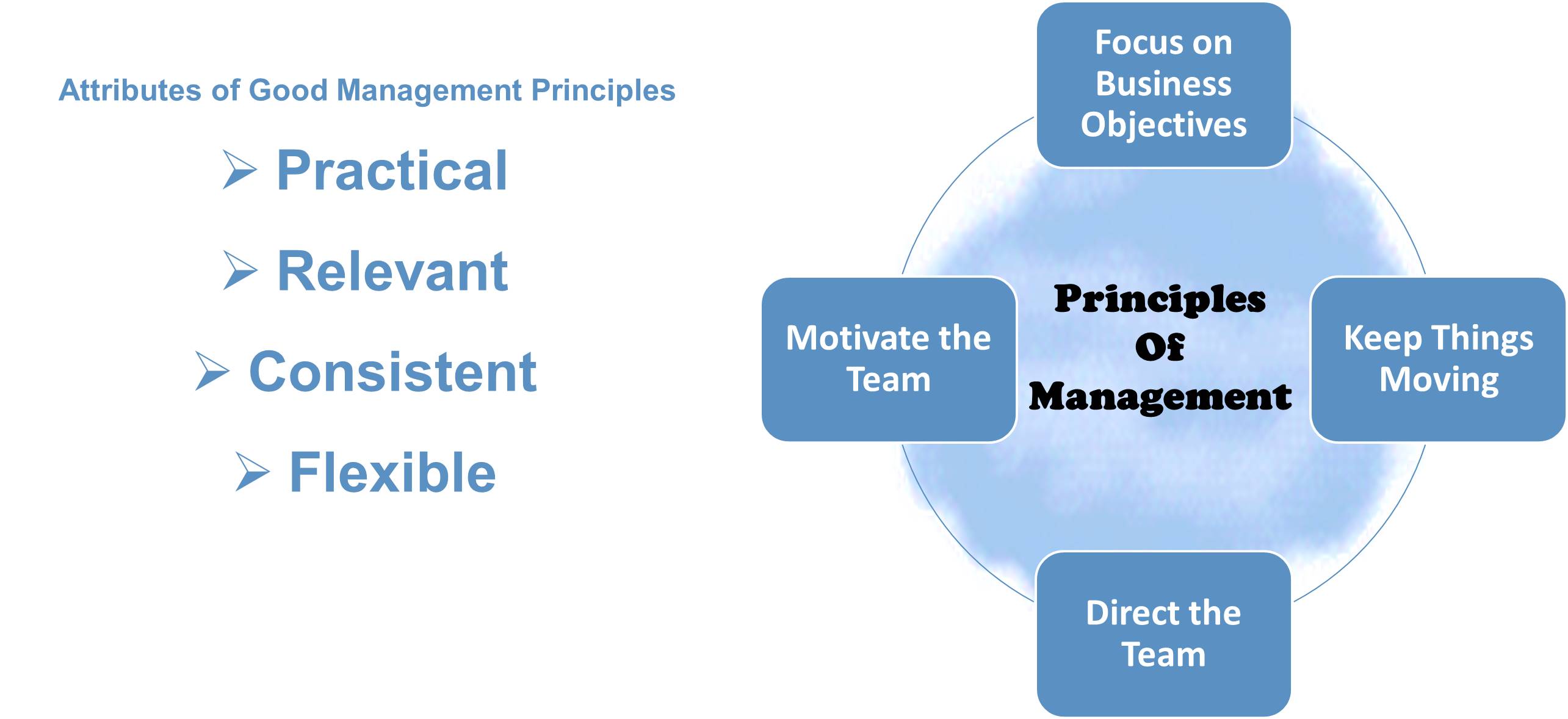- Home
- Business Processes
- Industry Knowledge
- Aerospace Industry
- Automotive Industry
- Banking Domain
- BFSI Industry
- Consumer/ FMCG Industry
- Chemicals Industry
- Engineering & Construction
- Energy Industry
- Education Domain
- Finance Domain
- Hospitality Domain
- Healthcare Industry
- Insurance Domain
- Retail Industry
- Travel and Tourism Domain
- Telecom Industry
- Leadership Skills
- eLearning
- Home
- Leadership
- Leadership Theories
- Principles of Management
Principles of Management
Principles of management are fundamental concepts and advisory guidelines for managerial decision making. By using management principles, managers can more easily achieve the objectives and avoid making mistakes in their activities. Management principles can be applied to any kind of organization and to managers at all organizational levels.
A principle can be defined as a fundamental statement of truth providing a guide to thought or action. Principles help to understand what results can be expected when a particular management principle is applied. These management principles emerge based on certain qualities/characteristics that have relevance to management theory and practice.
Principles of management are to the manager as a guidebook of strengths and weaknesses which provides fundamental truths, expressed as quantitative data based on years of experience and testing. The manager can use these principles to take timely guidance for various management issues as these management principles have been developed from years of experience and testing, in public and private, in big and small organizations. By using management principles, managers can effectively achieve business objectives and avoid making fundamental mistakes in their actions and decisions. They are basic guides and a framework for reference but not absolute as managers need to take actions based on the context in which they operate. They are like working hypotheses that are reasonably well established, accepted, and used in many successful organizations, and managers must adapt them to their specific situation.
As more research is conducted, we gain more understanding of the way management principles operate; new principles will emerge, some existing management principles will get modified, and some others will be discarded not being truly representative of management practice in today’s context.
Henri Fayol (1849-1925), a French industrialist and a prominent European management theorist, developed a general theory of management. Fayol outlined the fourteen principles of management. Given below are some of the other attributes of good management principles:
- Practical: Management principles should have a practical application, which means they can be applied in the organizational context and remain appropriate
- Relevant: Management principles should not be restricted to one business scenario but they should be invariably applicable to the various broad forms of organizational structures and different businesses operating in different business domains.
- Consistent: The management principles should be consistent in their applicability and application meaning thereby that under a similar set of circumstances, similar business results can be expected.
- Flexible: Business operates in different environments and has multiple types of products and services. They build different operational and organizational structures. Management principles should take into accounts the particular differences or changes in the conditions that affect the organization. The use of management principles is intended to simplify, guide, and facilitate management work.

Therefore, management principles are a guiding key to actions that should be taken in a particular business context. They provide the guidelines from which the manager can understand the situation and recommended action and apply that in his particular context. They represent the major considerations in current management thought.
Given below are some of the important principles of management that will help you to build a better understanding of the management process:
Focus on Business Objectives
Management is always purposeful focused on the achievement of specific business objectives and goals. Managerial success is measured by the extent to which these objectives have been met. Management should keep a continued focus on the work needed to be accomplished.
Keep Things Moving
Management is responsible for making things happen and meet business goals. Managers should focus their efforts on bringing about successful action as per the vision and mission of the organization. They must provide direction to set goals, keep things moving, follow through to ensure members of the group accomplish the task they have been assigned.
Directing the Team
Management is accomplished by managing the team. The manager needs to relinquish the natural tendency to perform all things oneself and should focus on getting the tasks accomplished through the efforts of the group members. Management is thus associated with the efforts of the group. A group is necessary to accomplish business goals as an enterprise comes into existence to attain these goals, and these goals can be achieved only through group effort rather than by one person alone.
Motivating the Team
Management is an outstanding means for exerting a real impact on human, social, and political life. A manager can do much to improve the work-environment he operates in and the resources he deals in. A manager must stimulate and motivate people to do things better, and in the process should assist favorable organizational actions to take place. A manager can achieve progress, bring hope, and help group members acquire the better things in life.
These principles of management will definitely help you in discharging your roles and responsibilities as a manager. Understanding these principles will also broaden your understanding of the theories of management that every manager should be aware of.
Suggested Reading and Resources
Related Links
You May Also Like
-
Theory Z also called the "Japanese Management" style is a leadership theory of human motivation focused on organizational behavior, communication, and development. It assumes that employees want to enter into long term partnerships with their employers and peers. Offering stable jobs with an associated focus on the well-being of employees results in increased employee loyalty to the company.
-
Power is the ability to exercise influence or control over others. Leadership involves authority and it is very important for leaders to understand what type of power they're using. The 5 Types of Power in Leadership are Coercive power, expert power, legitimate power, referent power, and reward power. Authority is the right to command and extract obedience from others. It comes from the organization and it allows the leader to use power.
-
Hawthorne Studies - Leadership
The Hawthorne studies were conducted on workers at the Hawthorne plant of the Western Electric Company by Elton Mayo and Fritz Roethlisberger in the 1920s. This study established the behavioral change that happened due to an awareness of being observed, resulting in active compliance with the supposed wishes of researchers, because of special attention received, or positive response to the stimulus being introduced.
-
Team leadership theory is a recent leadership theory that does not discriminate between the leader and the other team members. The approach considers contributions from each team member to be critical for organizational success. This approach focused on the overall team effectiveness and team problems are diagnosed and action is taken to remediate weakness. This approach provides for taking corrective action when the leader deems necessary.
-
In today's business world, proficiency in management skills is essential for career growth and success. Managerial skills can be defined as attributes or abilities that are essential for every leader and manager to succeed and fulfill specific tasks expected from them by the organization.
-
In its simplest sense, decision-making is the act of choosing between two or more courses of action. Decision making is a key skill in the workplace and is particularly important if you want to be an effective leader. When decisions have to be made, there are several stages that you should go through to reach a practical solution. Understand the meaning and importance of decision making and how to look at it as a process.
-
Management Principles by Fayol
Henri Fayol (1849-1925), a French industrialist and a prominent European management theorist, developed a general theory of management. Fayol outlined the fourteen principles of management.
-
Certain generally accepted truths or principles of communication are important to consider when communicating with others. These principles hold true for all people in every culture. By understanding these principles, you will experience greater communication effectiveness. An effective communication system is one that achieved its objectives. Communication is effective where there are no barriers to communication.
-
In this study of power, Raven identified five bases of power as coercive, reward, legitimate, referent, and expert. The 5 Types of Power can help you decide when it is appropriate to use a particular type of power in important situations. Leadership involves authority and it is very important for leaders to understand what type of power they're using.
-
Teams are part of the modern organizational culture. Whether you are a team leader or a team member, having a better understanding of how teams work, and being able to identify where the team is in the process, is a critical part of ensuring the team is ultimately successful. Start with the basics and understand what a team is and what role they play in an organization.
Explore Our Free Training Articles or
Sign Up to Start With Our eLearning Courses

About Us
Learning
© 2023 TechnoFunc, All Rights Reserved










